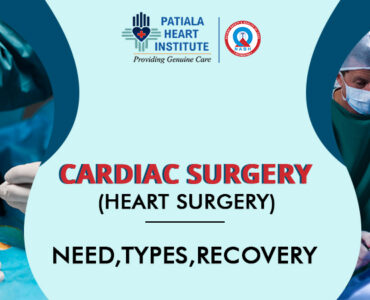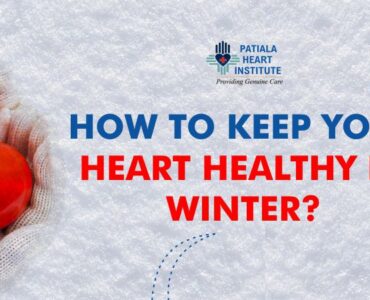“50% of heart attack patients in north India suffer from pre-diabetes.”
(Times of India)
Researchers strongly suggest there’s a strong link between diabetes and heart disease. In addition, people with diabetes are also vulnerable to other risk factors, such as high blood pressure or high cholesterol levels, which can result in a heart attack or stroke.
A specific biological mechanism has been discovered to increase the risk of heart attack or stroke in patients with diabetes, which can even result in death.
“Moreover, adults with diabetes are 2 to 4 percent more likely to die of heart disease than adults without diabetes.”
(Source: American Heart Association)
High blood sugar levels in patients may damage the blood vessels and interrupt the normal blood flow to the heart. Therefore, managing blood sugar levels, high blood pressure, and cholesterol levels becomes essential to avoid chronic heart diseases.
Let’s discover the symptoms and treatments to prevent any life-threatening risks. But before that, let us know a little bit about heart disease.
Table of Contents
ToggleWhat is Heart Disease?
Heart disease is a generalized term that refers to various types of heart problems. It is the leading cause of death in young men and women. The most common type of heart disease is coronary artery disease which develops over time. Normally, it occurs when the blood-supplying arteries become clogged with cholesterol-containing plaque, making it hard for the blood to reach the heart.
The plaque causes arteries to become hard and narrow, known as atherosclerosis. This narrowing down of arteries results in reduced blood supply to the heart and also makes it starving for oxygen and other nutrients. In addition, it causes the heart muscle to weaken over time and increases the person’s risk of heart failure, heart attack, or other heart diseases.
What is the Connection Between Diabetes and Heart Disease?
In addition to diabetes, diabetic patients are more likely to suffer from other conditions that raise the risk of heart disease:
- Hypertension or High Blood Pressure: It is assumed that people having diabetes and hypertension are at a much higher risk of heart disease than other individuals.
- Having unhealthy cholesterol and Triglyceride Levels: These things result in the building up of plaque in the arteries, and it is a significant risk factor in developing insulin resistance.
- Being Obese or Having BMI over 30: People who are obese and have diabetes are at a higher risk of cardiovascular diseases and being insulin resistant. So, losing the extra kilos might help you save your life.
- Not Enough Physical Activity: Not having enough physical activity increases the risk of obesity, type 2 diabetes, heart attack, and stroke. Therefore, exercising helps you maintain a moderate body weight and reduce blood pressure, saving you from all aforesaid complications.
- Eating an unhealthy diet: Individuals having unhealthy diets such as added sugars, salts, processed foods, refined grains, and saturated & trans fat are at risk of heart disease. So, you must make specific changes in your diet to become healthy.
How Does Diabetes Affect the Heart?
Diabetes can have a significant impact on the heart and blood vessels. When blood sugar levels are consistently high, it can develop fatty deposits in the arteries and eventually increase the risk of heart disease.
The high blood sugar levels associated with diabetes can also damage the blood vessels and affect their functioning. This can lead to issues such as high blood pressure, which further increases the risk of heart disease.
Additionally, uncontrolled diabetes can lead to diabetic neuropathy, which affects the nerves that control the heart and blood vessels. This can cause various issues, including irregular heartbeats and impaired blood flow, increasing the risk of heart disease and stroke.
People with diabetes need to maintain good control over their blood sugar levels through proper diet, exercise, medication management, and regular monitoring of their blood pressure and cholesterol levels. Observing these measures can help reduce the risk of heart disease and other complications associated with diabetes.
Why can people with diabetes have silent heart attacks?
Diabetic patients are at higher risk of experiencing “silent” heart attacks, also known as asymptomatic heart attacks, because high blood sugar levels can damage the nerves that control the heart and blood vessels, leading to numbness or decreased sensation in the chest and arms. This can make it difficult for people with diabetes to detect the signs of a heart attack, even if they are experiencing one.
In addition, others may have high blood pressure, which can also damage the nerves and blood vessels, making it harder to feel heart attack symptoms. Additionally, some may experience more subtle signs that can be mistaken for other conditions.
Cardio-diabetic patients need to be aware of the signs of a heart attack and seek medical attention immediately if they suspect they may have one, even if they are not experiencing typical symptoms. Early detection and treatment can improve the outcome and reduce the risk of complications.
What are diabetic heart attack symptoms?
You must know about diabetic heart attack symptoms, especially if you are a pre-diabetic or have type 1 or type 2 diabetes. A heart attack can cause the following:
- Chest pain or pressure,
- Shortness of breath,
- Fatigue,
- Lightheadedness and
- Discomfort or pain in the arms, neck, jaw, back, or stomach.
However, for people with diabetes, the symptoms can sometimes be more precise and not always as straightforward. Such as, they may experience the following:
- Dizziness,
- Headache, or
- Flu-like symptoms (often mistaken for other conditions).
It’s essential for diabetics to be mindful of the signs of a heart attack. The quicker they get help, the better the outcome is likely to be. So, if you or someone you know has diabetes, it’s a good idea to get acknowledged regarding the warning signs and seek prompt medical attention if any symptoms occur.
Tests For Heart Disease
Doctors recommend every man over 35 and women over 40 must go for a regular heart checkup yearly. So, if there are any complications, they are detected at the very first stage and treated without complexities. Also, no single test can diagnose heart disease. Usually, a doctor conducts a series of tests to understand the person’s overall health. These tests include:
- Blood Test,
- Echocardiogram,
- Transesophageal Echocardiography (TEE),
- Electrocardiograms (EKG),
- CT Scan,
- Stress Tests and many other tests
The Best Diet For Cardio-Diabetic Patients
A healthy diet is essential for managing both heart disease and diabetes. Here are some key elements of a diet that is good for your heart and blood sugar levels:
Consume whole or unprocessed foods:
Focus on eating a variety of whole, unprocessed foods, such as fruits and vegetables, whole grains, lean proteins, and healthy fats. These foods are naturally lower in unhealthy fats, salt, and added sugars, which can help to reduce the risk of heart disease and manage blood sugar levels.
Limit added sugars:
By incorporating whole, unprocessed foods and healthy snacks naturally low in added sugars, such as fresh fruits with nut butter, greek yogurt with berries, veggies with hummus, roasted nuts, and dark chocolate into your diet and being mindful of added sugars in processed foods, you can limit your added sugar intake while still enjoying delicious and nutritious food.
Incorporate healthy fats:
Healthy fats, such as those found in nuts, seeds, avocado, and olive oil, can help to lower cholesterol levels and reduce the risk of heart disease.
Control portion sizes:
Overconsumption of even healthy foods can lead to weight gain and increased blood sugar levels. Paying attention to portion sizes and eating until you’re satisfied but not stuffed can help manage your weight and blood sugar levels.
Reduce sodium intake:
High levels of sodium can increase blood pressure and increase the risk of heart disease. So, keep your sodium intake under 2,300 mg per day, and choose low-sodium options whenever possible.
Choose low-fat dairy products:
Low-fat dairy products, such as milk and yogurt, can be part of a healthy diet for heart and diabetes patients. These products provide essential nutrients, such as calcium and vitamin D, without the added saturated fat that can harm heart health.
Following these tips and incorporating healthy foods into your diet can keep your heart healthy, improve blood sugar levels, and maintain good overall health.
How can we prevent heart disease in people with diabetes?
To maintain good heart health and prevent serious complications, people with diabetes need to undertake specific preventive measures:
- Control blood sugar levels: Maintaining good control over blood sugar levels is one of the most important steps in preventing and treating heart disease. You can do this with a healthy diet, regular physical activity, and taking medications as prescribed.
- Manage blood pressure: High blood pressure is a significant risk factor for heart disease, and people with diabetes are at a higher risk. Regular monitoring of blood pressure and taking steps to keep it in a healthy range can help reduce the risk of heart disease.
- Control cholesterol levels: Eating a healthy diet low in saturated and trans fats and taking cholesterol-lowering medications, if prescribed, can help keep cholesterol levels under control.
- Quit smoking: Smoking can significantly increase the risk of heart disease. Quitting smoking is one of the best things you can do to reduce the risk of heart disease and improve overall health.
- Exercise regularly: Regular physical activity can help lower blood sugar levels, improve cardiovascular health, and reduce the risk of heart disease among diabetics. Aim for at least 30 minutes of moderate-intensity exercise most days of the week.
- Take medications as prescribed: If prescribed medications, such as aspirin or statins, it’s essential to take them as directed to help prevent heart disease.
Final Words
So, if you follow these steps and work closely with a healthcare provider, people with diabetes can prevent the risk of heart disease in the long run. For more information, book an appointment with Patiala Heart Institute today.
Should people with diabetes see a cardiologist?
You should see a cardiologist if you are a diabetic patient with heart disease symptoms, such as chest pain or trouble breathing. They can take good care of you, guide you to prevent any severe illness, and help you maintain good heart health.
Can insulin damage the heart?
A study shows that too much insulin in the blood, known as hyperinsulinemia, triggers the molecule chain reaction that damages the heart cells and contributes to heart failure. Also, insulin exacerbates the risk of obesity, type 2 diabetes, and cardiovascular diseases.







